As remote work becomes the new global standard, companies are increasingly seeking reliable platforms to hire and manage distributed teams. Oyster HR is one such remote-first Employer of Record (EOR) provider—but many businesses report limitations in support, cost transparency, and platform flexibility. If you’re evaluating Oyster HR alternatives in 2025, this guide is for you.
We outline the best Oyster competitors, user-reported pain points, platform comparisons, and critical decision-making criteria for global HR leaders, founders, and scaling startups.
Table of Contents
- What Does Oyster HR Provide?
- Why Should You Consider Oyster HR Alternatives?
- Top 8 Oyster HR Competitors & Alternatives in 2025
- Detailed Comparison of Top 8 Oyster HR Alternatives (2025)
- Common Mistakes When Switching from Oyster HR
- How to Choose the Best Oyster HR Alternative
- Why Choose Asanify Over Oyster HR?
- FAQs
What Does Oyster HR Provide?
Founded in 2019, Oyster HR is a digital-first global employment platform helping companies hire full-time employees in over 180 countries. The platform is tailored for remote teams and focuses on compliance, payroll, and onboarding workflows.
Core Services:
- Global EOR in 180+ countries
- Time-off and leave management
- Localized employment compliance
- Contractor management (limited markets)
- Digital onboarding and document flows
- Remote benefit provisioning
Oyster stands out with its easy-to-use dashboard and wide international reach. However, certain teams outgrow the platform’s limitations as their global complexity increases.
Why Should You Consider Oyster HR Alternatives?
While Oyster is great for small remote-first teams, user feedback highlights key challenges that push companies toward more mature, flexible platforms:
1. Support Gaps and Lack of Live Assistance
- Oyster’s support is email-based only, with no live chat or phone assistance
- Users report slow response times during critical onboarding phases
- No dedicated HR advisors in key markets like APAC or MENA
“Great dashboard, but we were on our own during onboarding delays in Latin America.” — User on Reddit
2. Hidden Fees and Deposit Model
- Oyster charges a 1-month refundable deposit, which many users weren’t informed of upfront
- Setup, benefit, and exit fees are sometimes not clearly disclosed in early sales conversations
- Not ideal for companies budgeting with transparent per-employee pricing
3. Limited Ownership and Customization
- Oyster relies on third-party partners for legal entities in most countries
- Customization of contracts, benefits, and payroll can be limited
- Integration capabilities with HRIS or finance tools are narrower than competitors like Deel or Rippling
4. Inflexible for Hybrid Teams
- Oyster is primarily built for full-time remote employment, with limited support for contractors or hybrid teams
- Not suited for companies needing both contractors and EOR employees under one roof
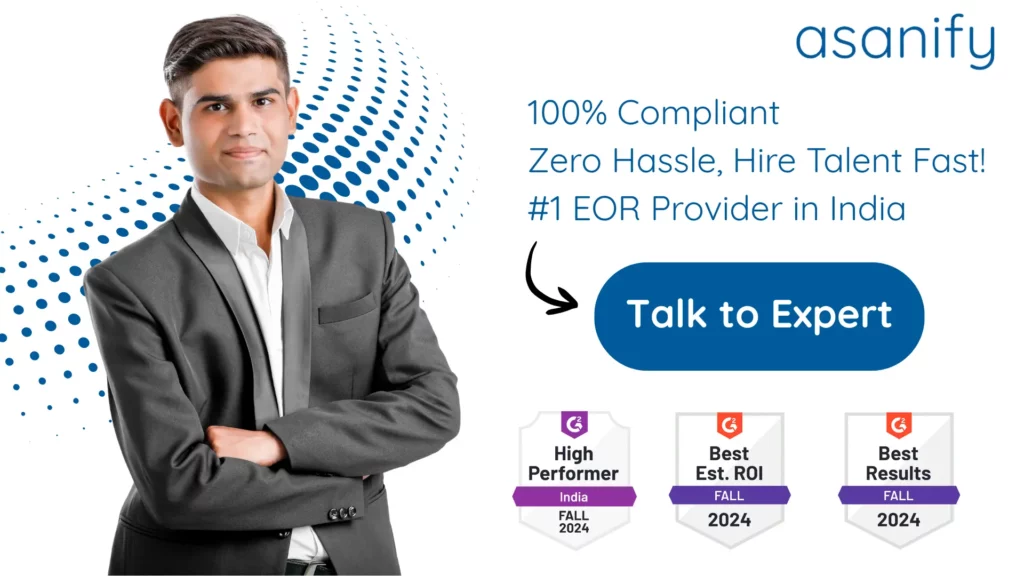
Top 8 Oyster HR Competitors & Alternatives in 2025
1. Asanify
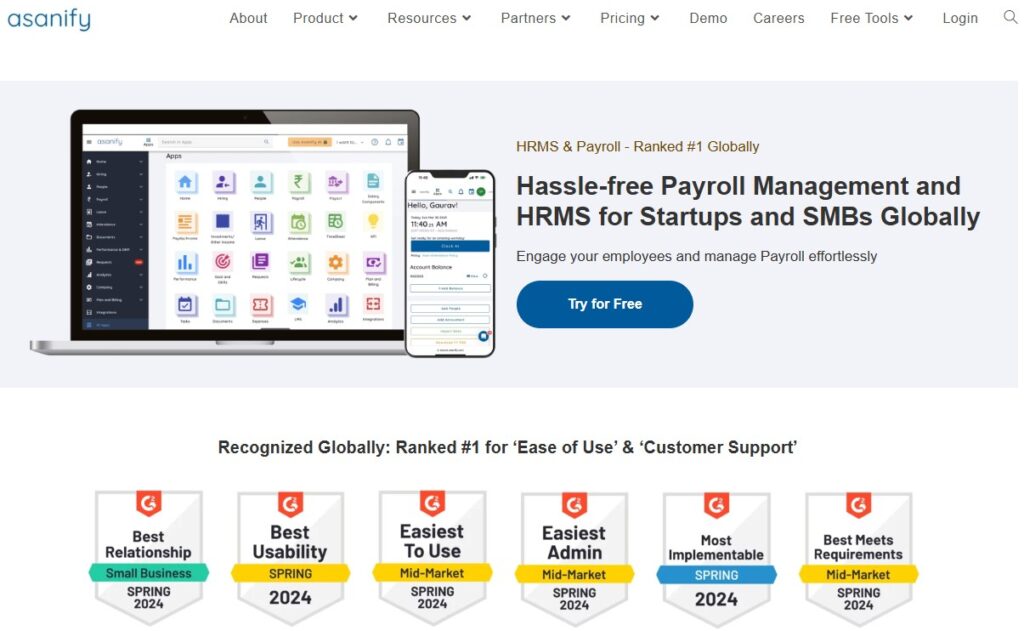
EOR in India, UAE, Singapore & the Philippines
Asanify is a localized and fast-moving Oyster HR alternative for companies expanding into Asia and the Middle East. It offers Employer of Record Services, payroll, tax compliance (TDS, PF, ESI), visa services, and contractor payments with transparent pricing. Asanify also provides 5–7 day onboarding, real-time HR advisory, and multi-currency payouts tailored to local laws. Its hands-on support makes it ideal for startups and SMBs seeking agility and compliance in emerging markets.
Key Features:
- 5–7 day onboarding
- No deposits or hidden charges
- Multi-currency payouts
- Local HR advisors
- Visa & mobility support
Pricing:
- EOR: $299–399/employee/month
- Contractors: $29–49/contractor/month
| Pros | Cons |
| Localized compliance expertise | Focused on APAC & MENA only |
| No hidden costs | Fewer global integrations |
| Fast documentation and setup | Limited coverage outside Asia |
| Strong customer support | Lower brand awareness in the West |
G2 Rating: 4.8/5
2. Deel
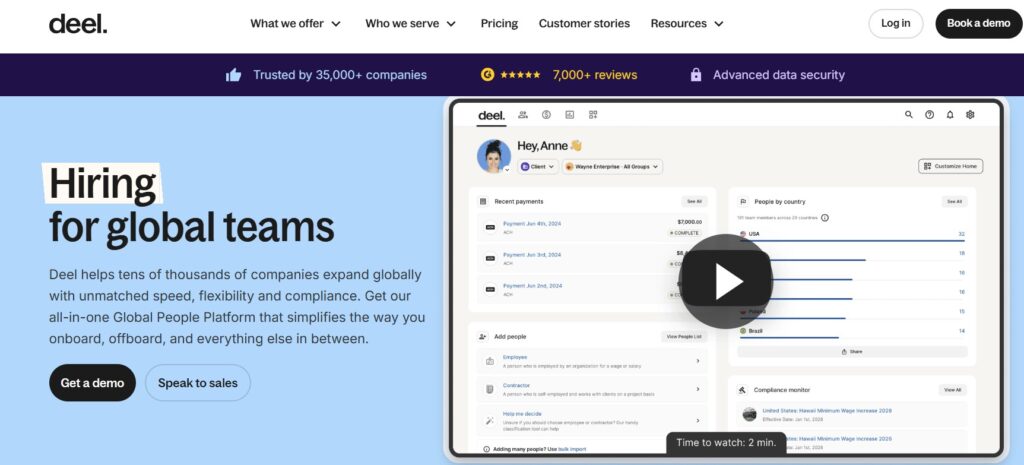
Global EOR + Contractor Platform
Deel is ideal for companies seeking automation, legal infrastructure, and robust integrations. It supports 100+ countries with top-tier UI and legal compliance engines.
Key Features:
- Global equity and stock options
- 600+ software integrations
- Country-specific legal templates
- Full contractor support
- IP and data transfer safeguards
Pricing:
- EOR: From $599/employee/month
- Contractors: $49/contractor/month
| Pros | Cons |
|---|---|
| Excellent UI and intuitive dashboard | Premium pricing may not suit small teams |
| Global coverage with strong legal compliance | Add-ons and advanced features may incur extra charges |
| Supports both contractors and full-time employees | Support responsiveness can vary across regions |
| 600+ integrations with HR, finance, and payroll tools | Not fully localized in every market |
| Robust IP protection and equity management | Learning curve for complex compliance configurations |
G2 Rating: 4.7/5
3. Remote
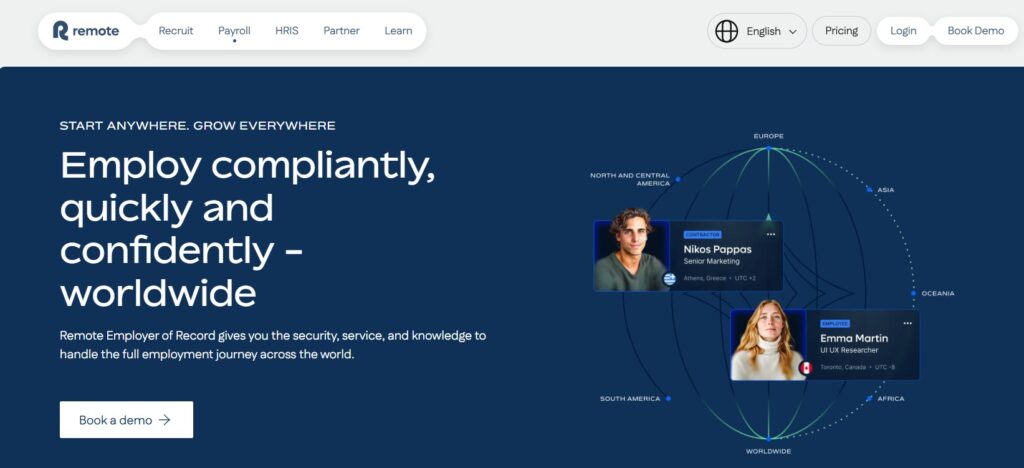
Flat Pricing + Owned Entities
Remote offers full EOR services with its own legal infrastructure in 70+ countries. Known for its transparent pricing and emphasis on IP protection, it’s a strong Oyster HR alternative for growing teams.
Key Features:
- Owned legal entities
- Flat-rate pricing
- Localized benefits & payroll
- Global contractor payouts
- IP and equity compliance
Pricing:
- EOR: $599/employee/month
- Contractors: $29/contractor/month
| Pros | Cons |
|---|---|
| Transparent flat-rate pricing | Onboarding speed may vary by country |
| Owns legal entities in 70+ countries | Less benefit customization compared to some competitors |
| Strong IP protection and equity compliance | Limited local HR advisory in emerging markets |
| Supports both EOR and contractor payments | Some users report inconsistent support experiences |
| Localized benefits and compliant payroll processing | Not ideal for companies needing deep customization |
G2 Rating: 4.6/5
4. Rippling
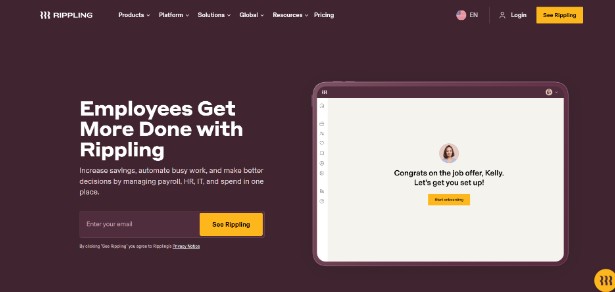
Unified Global Workforce Platform
Rippling integrates HR, IT, and finance with EOR built into its ecosystem. It’s best for mid-size to large companies seeking full workflow control across global and domestic teams.
Key Features:
- IT device management + HRIS
- 600+ app integrations
- Global payroll and contractor payments
- Deep automation workflows
Pricing:
- EOR: $500–600/employee/month
- Contractors: $29/contractor/month
- Core HR: From $8/user/month
| Pros | Cons |
|---|---|
| Unified platform combining HR, IT, and finance | Can be overly complex for small or early-stage companies |
| 600+ integrations with HRIS, payroll, and accounting tools | Pricing structure may lack transparency |
| Strong global payroll and contractor management capabilities | Less focused on emerging markets |
| Advanced automation across workflows | Steeper learning curve for new users |
| IT device provisioning and security built into the platform | Requires adoption of broader ecosystem for full value |
G2 Rating: 4.6/5

5. Skuad
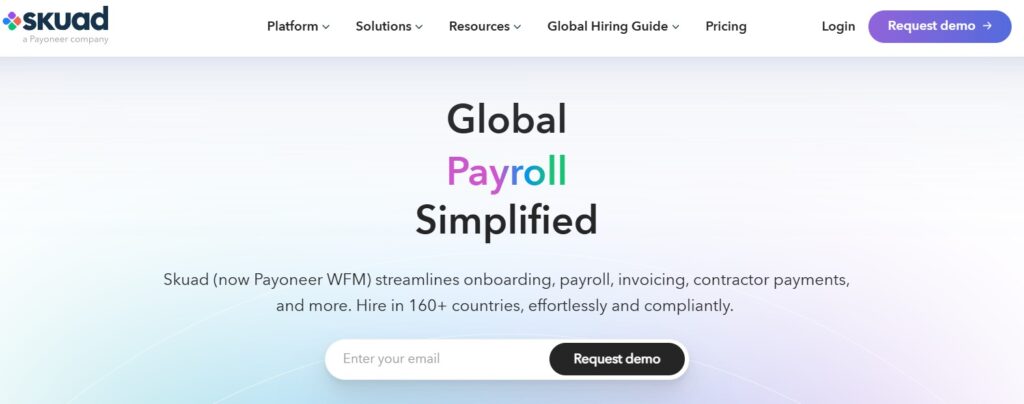
Fast Onboarding + Budget-Friendly
Skuad is an ideal option for companies looking for fast onboarding and cost-effective EOR coverage across 160+ countries. It supports contractors, offers IP protection, and provides real-time onboarding dashboards.
Key Features:
- 24/7 live support
- No deposits or hidden costs
- Fast onboarding in emerging markets
- Localized benefits & payroll
Pricing:
- EOR: From $399/employee/month
- Contractors: $19–29/contractor/month
| Pros | Cons |
|---|---|
| Competitive and budget-friendly pricing | Not as feature-rich for enterprise-level needs |
| Fast onboarding cycles in emerging markets | Fewer integrations than Deel or Rippling |
| 24/7 global live support | Limited visibility into backend legal operations |
| No upfront deposits or hidden fees | Still expanding global footprint and brand recognition |
| Supports both EOR and contractor models | May lack advanced analytics or automation features |
G2 Rating: 4.6/5
6. Velocity Global
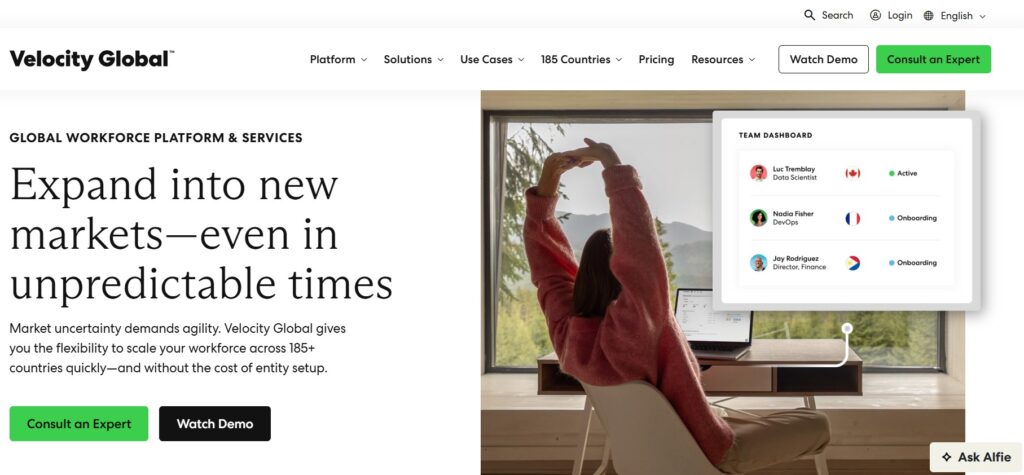
Broad Global EOR Footprint
Velocity Global provides both EOR and contractor management across 185+ countries. It’s a good fit for mid-to-large businesses needing workforce analytics and localized payroll.
Key Features:
- Full EOR & contractor support
- Local entity coverage
- Visa & benefit provisioning
- Compliance dashboards
Pricing:
- EOR: $599+/employee/month
- Contractors: Available
| Pros | Cons |
|---|---|
| Wide global coverage with presence in 185+ countries | Premium pricing may not suit small or scaling teams |
| Supports both EOR and contractor hiring models | Fee structure can lack clarity or predictability |
| Offers visa sponsorship and benefit management | Onboarding timelines may vary by region |
| Provides compliance dashboards and workforce analytics | Limited customization for hybrid or tech-specific workflows |
| Strong enterprise focus and reputation | Customer support responsiveness can be inconsistent |
G2 Rating: 4.6/5
7. Papaya Global
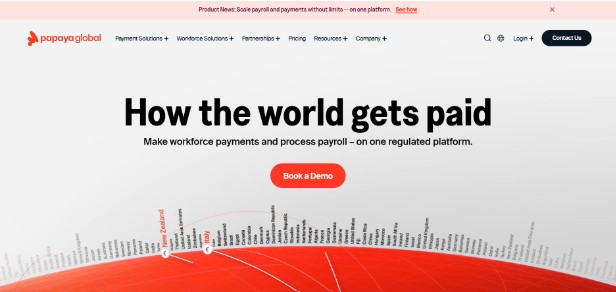
Enterprise Payroll + Analytics
Papaya offers rich compliance dashboards, global HRIS capabilities, and robust analytics. It’s well-suited for data-driven teams and enterprises seeking more from an EOR than just onboarding.
Key Features:
- Real-time analytics
- Benefit & insurance management
- Payroll in 160+ countries
- Compliance automation
Pricing:
- EOR: From $599+/employee/month
- Setup and legal fees may apply
| Pros | Cons |
|---|---|
| Real-time workforce analytics and dashboards | Pricing can be high for startups and small businesses |
| Strong compliance automation and alert systems | Onboarding process may be complex for smaller teams |
| Global HRIS and payroll in 160+ countries | Additional charges for setup and advanced features |
| Robust benefit and insurance management options | Less tailored for highly localized or hybrid team structures |
| Enterprise-grade security and data protection | Limited flexibility for region-specific customization |
G2 Rating: 4.5/5
8. Globalization Partners
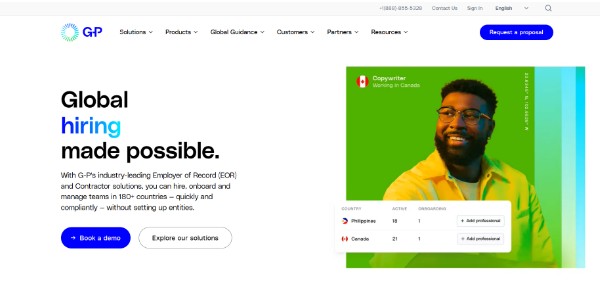
Customizable Enterprise-Grade EOR
Globalization Partners is an established EOR provider with its own legal entities in 180+ countries. Ideal for large organizations, G-P offers enterprise security, immigration support, and tailored benefits.
Key Features:
- Visa + immigration services
- Local HR compliance
- SOC 2 + ISO certifications
- Owned legal infrastructure
Pricing:
- EOR: ~15% of salary ($1,500+/month)
- Contractors: Not supported
| Pros | Cons |
|---|---|
| Fully owned legal entities in 180+ countries | Very high cost, with ~$1,500+/month minimum |
| Enterprise-grade compliance and security (SOC 2, ISO certified) | Not suitable for startups or cost-sensitive teams |
| Offers visa sponsorship and immigration support | Does not support contractor management |
| Customizable benefit and payroll packages | Slower onboarding process compared to leaner platforms |
| Strong reputation and global enterprise client base | Complex pricing structure and limited transparency |
G2 Rating: 4.6/5
Detailed Comparison of Top 8 Oyster HR Alternatives (2025)
To help you make an informed decision, we’ve compared the top Oyster HR alternatives across key factors like pricing, regional focus, G2 ratings, and ideal use cases. This snapshot offers a quick view of which platform best fits your global hiring needs in 2025.
| Platform | G2 Rating | EOR Price | Region Focus | Best For |
| Asanify | 4.8 | $299–399/month | APAC, MENA | Fast-growing startups |
| Deel | 4.7 | $599/month | Global | Legal and equity-focused hiring |
| Remote | 4.6 | $599/month | Global | IP protection + flat pricing |
| Rippling | 4.6 | $500–600/month | US, Global | HR + IT automation |
| Skuad | 4.6 | $399/month | Global | Cost-effective scaling |
| Velocity Global | 4.6 | $599+/month | Global | Compliance + analytics |
| Papaya Global | 4.5 | $599+/month | Global | Payroll + reporting dashboards |
| Globalization Partners | 4.6 | $1,500+/month | Global enterprise | Enterprise-grade customization |
Common Mistakes When Switching from Oyster HR
Transitioning from Oyster HR to another global hiring platform can bring efficiency and cost benefits—but only if done thoughtfully. Avoid these common mistakes that companies often make during the switch:
- Ignoring hidden deposit models: Some providers require upfront deposits or hidden fees not disclosed early in the sales process.
- Assuming all platforms support both EOR + contractors: Not all EOR platforms offer contractor management—confirm this before migrating.
- Overlooking time zones or onboarding timelines: Delays often happen when vendors can’t meet local onboarding SLAs in your target countries.
- Not checking HRIS or finance integrations: Lack of integration with your existing tools can lead to manual work and inefficiencies.
- Choosing tools without local HR advisors: Without localized support, resolving region-specific compliance issues can be difficult.
- Skipping visa or mobility consultation: Immigration complexities can disrupt onboarding if your vendor lacks visa advisory services.
How to Choose the Best Oyster HR Alternative
Selecting the right Oyster HR alternative requires more than just comparing pricing or features. You need to evaluate how well each platform aligns with your business model, compliance needs, and global expansion goals. Below are the key factors to consider:
- Support model: Prefer 24/7 live support over email-only assistance for faster issue resolution.
- Owned vs. partnered entities: Platforms with owned entities ensure faster, more compliant onboarding.
- Contractor + EOR flexibility: Choose providers that support both full-time employees and contractors.
- Cost transparency and deposits: Look for clear, upfront pricing without hidden fees or mandatory deposits.
- Regional compliance expertise: Ensure strong knowledge of local tax, labor, and employment regulations.
- Integration options: Pick tools that integrate well with your HR, finance, and payroll systems.
- Visa, mobility, and tax support: Opt for providers offering end-to-end global mobility and tax guidance.

Why Choose Asanify Over Oyster HR?
For companies expanding into India, the UAE, Southeast Asia, and the broader MENA region, Asanify stands out as a faster, leaner, and more compliant alternative to Oyster HR. Its platform is purpose-built for emerging markets, where localized tax frameworks, visa complexities, and employment law nuances demand a high level of regional expertise. Asanify not only simplifies global employment but also ensures that your remote team remains fully compliant with local labor regulations.
Benefits:
- Transparent pricing with no deposit: Unlike many global platforms, Asanify charges no upfront setup fees or refundable deposits, making it highly predictable for budgeting.
- 5–7 day onboarding in key markets: Rapid onboarding cycles in India, UAE, Singapore, and the Philippines enable faster time-to-productivity for your distributed hires.
- Visa, payroll, and contractor support: Asanify handles visa sponsorship, cross-border payments, and supports both EOR employees and freelancers in one dashboard.
- PF, TDS, and ESI compliance built-in: Indian payroll intricacies like Provident Fund (PF), Employee State Insurance (ESI), and Tax Deducted at Source (TDS) are managed seamlessly.
- Real-time HR consultation: Get access to local HR and legal experts who can offer country-specific guidance on contracts, benefits, and compliance requirements.
If you’re scaling into high-growth, regulation-intensive regions like Asia and MENA, Asanify emerges as one of the most dependable and cost-effective Oyster HR alternatives available in 2025. Its combination of regional expertise, responsive support, and transparent operations makes it especially suitable for startups and SMBs looking to grow without legal headaches or bloated overhead.
FAQs
Asanify and Skuad offer the most competitive pricing with no setup or deposit fees.
Limited support. Choose Deel, Remote, or Asanify for full contractor flexibility.
Asanify and Remote can complete onboarding in under a week.
Skuad, Deel, and Asanify offer 24/7 support or live advisors.
Asanify leads with localized expertise in India, UAE, and Southeast Asia.
Globalization Partners and Papaya Global provide enterprise-grade services.
Yes—1-month deposit, exit fees, and premium benefit charges apply.
Not to be considered as tax, legal, financial or HR advice. Regulations change over time so please consult a lawyer, accountant or Labour Law expert for specific guidance.




